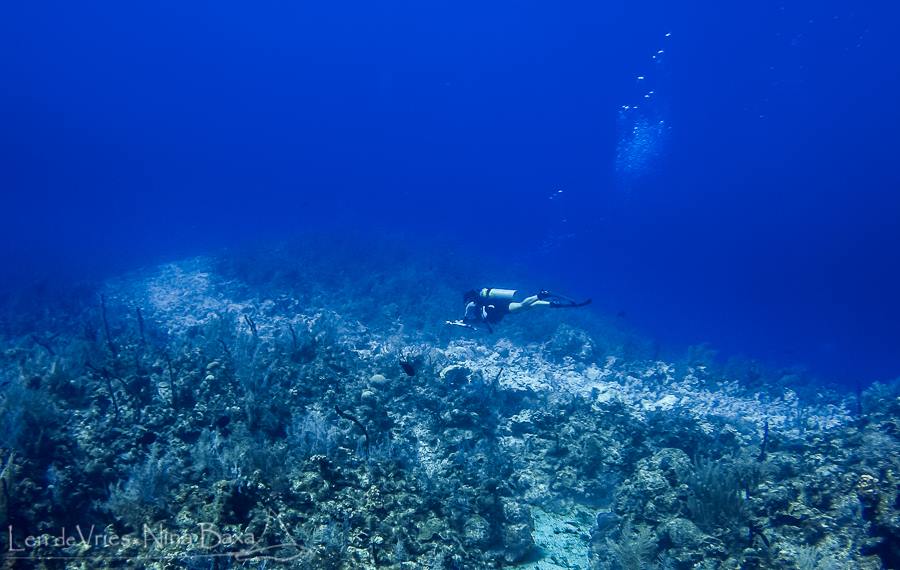Marine Life & Conservation
Ocean Frontier’s Lois Hatcher Helping Lead The Way In Cayman Volunteer Reef Restoration Project
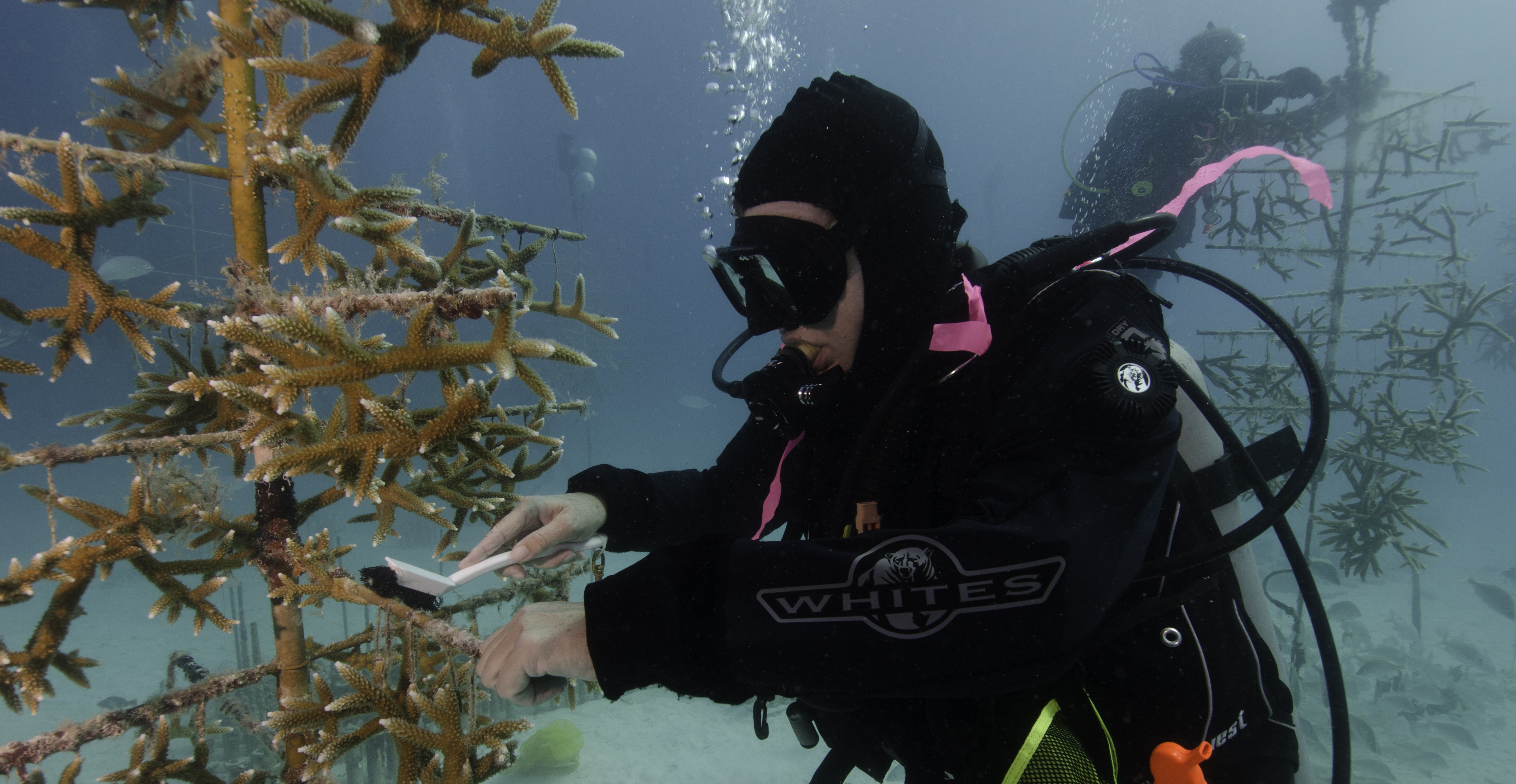
Dive experience and education fuel her passion for the sea and has made reef conservation a personal mission
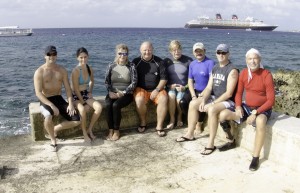 “I see dead coral – and in the back of my mind I’m saying, we can do something about this.”
“I see dead coral – and in the back of my mind I’m saying, we can do something about this.”
Lois Hatcher, who has been diving for more than 30 years and has seen the world’s oceans decline, IS doing something about it. She’s leading a hard-core group of volunteer divers in Grand Cayman who are working diligently to restore a large section of reef damaged by a cruise ship anchor in mid-September. They have been sifting through the rubble and dead coral, and salvaging pieces of live coral.
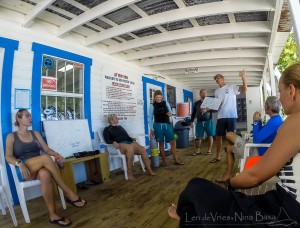 “If the pieces still have a little keyhole of light, the coral is still alive,” says Hatcher, who dives five days a week as the Photo Pro for Ocean Frontiers, and as project co-coordinator and a team leader, spends her days off at the recovery site. Lois and her team have already “out planted,” or reattached, about 15 pieces of live coral.
“If the pieces still have a little keyhole of light, the coral is still alive,” says Hatcher, who dives five days a week as the Photo Pro for Ocean Frontiers, and as project co-coordinator and a team leader, spends her days off at the recovery site. Lois and her team have already “out planted,” or reattached, about 15 pieces of live coral.
“We are trying to focus on the slow-growing corals and attaching them to open areas in the surrounding reef to give them a chance to keep growing. We are seeing signs of life and this gives us hope,” she says. “They are looking really, really good!”
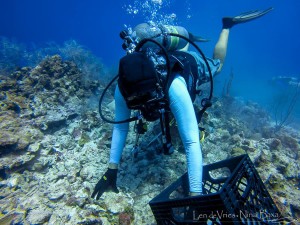
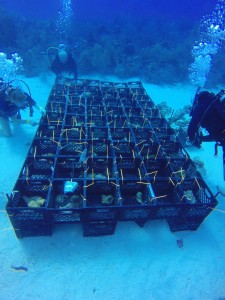 Lois Hatcher is using proven techniques that she has learned from some of the world’s leading experts in coral restoration; Dr. Alex Brylske, a renowned professor of Marine Environment Technology at Florida Keys Community College and Ken Nedimyer president of the Coral Restoration Foundation.
Lois Hatcher is using proven techniques that she has learned from some of the world’s leading experts in coral restoration; Dr. Alex Brylske, a renowned professor of Marine Environment Technology at Florida Keys Community College and Ken Nedimyer president of the Coral Restoration Foundation.
She was enrolled in Dr. Brylske’s first undergraduate course in coral restoration, and spent a year taking other marine science classes. Her former professor remembers an eager and enthusiastic student, so he’s not surprised by the role she has undertaken with the Magic Reef Restoration Project.
“I expected no less from Lois, even though it’s taken longer to happen than she had hoped,” he says. “Her goal was to do exactly what she seems to be doing—taking what she learned and applying it in other areas.”
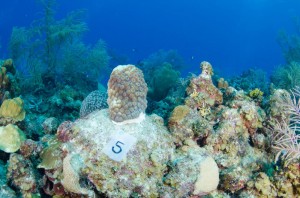 Ken Nedimyer says the restoration work is a start in the right direction. “Some people look at it as too little too late, but the little bit of progress being made is better than inaction. Like me, Lois has spent a lot of time underwater and has come to appreciate all the little creatures there, both big and small. She has seen first-hand the dramatic decline of coral reefs in the Caribbean, so she has sought out ways to help.”
Ken Nedimyer says the restoration work is a start in the right direction. “Some people look at it as too little too late, but the little bit of progress being made is better than inaction. Like me, Lois has spent a lot of time underwater and has come to appreciate all the little creatures there, both big and small. She has seen first-hand the dramatic decline of coral reefs in the Caribbean, so she has sought out ways to help.”
“Lois is a solid, dedicated team leader – the backbone of this project – and she knows her stuff when it comes to coral restoration,” say project co-coordinator Keith Sahm of Sunset House. “She has spent countless hours driving back and forth from East End, where she lives, to work on the damaged area every minute she has free. Lois intends to do whatever she can to see the coral reefs of Cayman get back to where they were!”
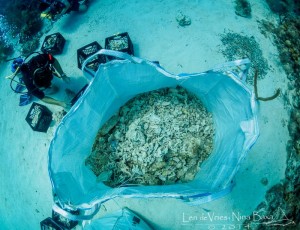 Sahm and Hatcher both say the biggest challenge to the restoration project, estimated to take a year to complete, is keeping up enthusiasm among the volunteer divers, whose numbers are dwindling as business picks up in advance of season. Both Dr. Alex Brylske and Ken Nedimyer have advice on that.
Sahm and Hatcher both say the biggest challenge to the restoration project, estimated to take a year to complete, is keeping up enthusiasm among the volunteer divers, whose numbers are dwindling as business picks up in advance of season. Both Dr. Alex Brylske and Ken Nedimyer have advice on that.
“In my experience there’s no need to keep volunteers motivated,” says Dr. Brylske. “Folks who do this are always willing to help. The only thing that can thwart enthusiasm is for projects to be hindered or halted by governmental interference or red tape. That’s the death knell to any project.”
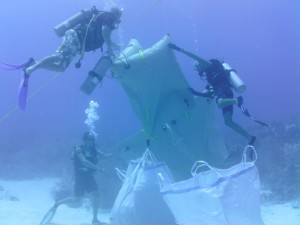 “Empowering recreational divers to help restore our coral reefs is an essential step in doing this on a scale big enough to make a difference,” adds Nedimyer. “Appreciation and recognition will go a long way.”
“Empowering recreational divers to help restore our coral reefs is an essential step in doing this on a scale big enough to make a difference,” adds Nedimyer. “Appreciation and recognition will go a long way.”
Sean Kingscote, a regular volunteer diver, says the team can count on him. “Volunteering is in my blood and have raised my children to understand that by giving back selflessly, it will be reward enough in the end. So until this reef is repaired I will be out as often as I can to help.”
The volunteers are already reaping the rewards of their work by witnessing life return to the damaged reef.
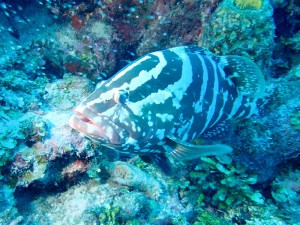 “Today I saw a decorator crab with big pieces of algae attached to its shell – and I hadn’t seen one in 20 years!” says an excited Lois Hatcher. “Now we have a friendly grouper that has moved in and it follows the divers around watching us work – we call it the ‘Supervisor.’ It reminds us that these creatures need a home so what we are doing is repairing their home.”
“Today I saw a decorator crab with big pieces of algae attached to its shell – and I hadn’t seen one in 20 years!” says an excited Lois Hatcher. “Now we have a friendly grouper that has moved in and it follows the divers around watching us work – we call it the ‘Supervisor.’ It reminds us that these creatures need a home so what we are doing is repairing their home.”
Ocean Frontiers co-founder Steve Broadbelt was well aware of Hatcher’s background and training when he hired her in 2012. He plans to establish a coral nursery at Ocean Frontiers, one of Grand Cayman’s most conservation minded companies.
“East End has the healthiest reefs on the island and we want to keep it this way by being prepared for environmental challenges that may come up,” says Broadbelt. “The nursery will be an on-going coral farm to help seed our reefs as needed to keep them healthy and thriving.”
During the past 20 years Hatcher has seen first hand the changes in Cayman’s reefs.
“The Elkhorn and Staghorn coral that used to be plentiful here are now hard to find,” she says. “We need to stop the loss of coral – if we save half of it, its still better than none and complete loss.”
Ken Nedimyer says the coral reefs of the world, and particularly the Caribbean, are in a very serious state of decline. Some are almost totally gone, so coral “gardening” is their last hope.
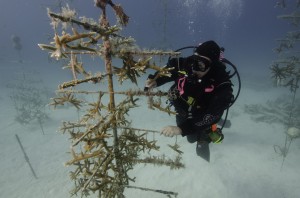
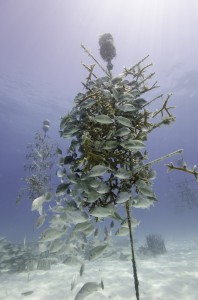 He says coral nurseries and coral gardens now exist in Fiji, Indonesia, Maldives, India, Israel, Egypt, Philippines, Japan and other places worldwide. In the Caribbean there are coral nurseries in the Bahamas, St Thomas, St Croix, British Virgin Islands, Puerto Rico, Dominican Republic, Jamaica, Belize, Bonaire, and Colombia. The Coral Restoration Foundation is planning to start nurseries in Jamaica, Curacao, Guadeloupe, the Grenadines, and Barbados during the next year.
He says coral nurseries and coral gardens now exist in Fiji, Indonesia, Maldives, India, Israel, Egypt, Philippines, Japan and other places worldwide. In the Caribbean there are coral nurseries in the Bahamas, St Thomas, St Croix, British Virgin Islands, Puerto Rico, Dominican Republic, Jamaica, Belize, Bonaire, and Colombia. The Coral Restoration Foundation is planning to start nurseries in Jamaica, Curacao, Guadeloupe, the Grenadines, and Barbados during the next year.
Lois Hatcher likes to remember a quote from one of her heroes, when she’s tired and thinking about the daunting task ahead them as they repair the coral reef.
“Oceanographer Sylvia Earle says ‘No Blue, No Green.’ If we don’t have the ocean, we don’t have us.”
About Ocean Frontiers and Compass Point Dive Resort
Ocean Frontiers Dive Shop is located at Compass Point Dive Resort on the remote East End of Grand Cayman. Founded in 1996 with one dive boat and a dream to introduce divers to the wonders of East End diving, the company has grown into one of Cayman’s premier dive operations with a reputation for catering to small groups and having the island’s friendliest staff. Ocean Frontiers is also recognized as one of the most conservation-minded dive operators in the Cayman Islands with a long history of promoting ocean protection through its company programs, and an unwavering support for outside environmental projects. The winner of Project AWARE’s Environmental Achievement Award in 2004 and 2010, Ocean Frontiers has again been recognized in 2012. The company also received the PADI Green Star Dive Center accreditation in 2012 for demonstrating a dedication to conservation, the first dive operator in the Cayman Islands to receive this distinction.
The Compass Point Dive Resort, which received the Green Globe Certification award in 2010 for sustainable tourism, is the epitome of laid-back luxury. It features 28 luxurious one, two and three bedroom oceanfront, ocean view and poolside condominiums, each with its own private patio or balcony and all beautifully decorated with stylish island décor, and fully equipped with all of the comforts of home. Eagle Ray’s Dive Bar and Grill is now open for business at the resort.
For more information:
Call Toll Free: 1 800-348-6096, Grand Cayman call (345) 640 7500
E-mail: info@oceanfrontiers.com, Website: www.oceanfrontiers.com.
Facebook.com/caymanscubadiving
LinkedIn: Ocean Frontiers
Blogs
The Ocean Cleanup Breaks 10,000,000 KG Barrier

The Ocean Cleanup, the global non-profit project, has removed a verified all-time total of ten million kilograms (22 million lbs.) of trash from oceans and rivers around the world – approximately the same weight as the Eiffel Tower.
To complete its mission of ridding the oceans of plastic, The Ocean Cleanup uses a dual strategy: cleaning up the Great Pacific Garbage Patch (GPGP) to remove the plastic already afloat in the oceans, while stopping the flow of plastic from the world’s most polluting rivers.
Through cleaning operations in the GPGP and in rivers in eight countries, the cumulative total of trash removed has now surpassed ten million kilograms. This milestone demonstrates the acceleration of The Ocean Cleanup’s impact, while underlining the astonishing scale of the plastic pollution problem and the need for continued support and action.
While encouraging for the mission, this milestone is only a staging point: millions more tons of plastic still pollute our oceans and The Ocean Cleanup intends to continue learning, improving and innovating to solve this global catastrophe.
This announcement comes as governments from around the world meet to continue negotiations to develop a new legally binding instrument to end plastic pollution at INC4 in Ottawa, Canada. Representatives of The Ocean Cleanup will be in attendance and the organization will be urging decision-makers to collaborate towards a comprehensive and ambitious global treaty which addresses plastic at all stages of its life cycle and in all marine environments worldwide, including in areas beyond national jurisdiction.
It is encouraging to see that the need for remediation is reflected in the various options for potential treaty provisions. It is essential that the final treaty contains clear targets for the remediation of legacy plastic pollution, and reduction of riverine plastic emissions.
Tackling plastic pollution requires innovative and impactful solutions. The treaty should therefore incentivize the innovation ecosystem by fostering innovations that make maximal use of data, technology and scientific knowledge – such as those designed and deployed by The Ocean Cleanup.
‘After many tough years of trial and error, it’s amazing to see our work is starting to pay off – and I am proud of the team who has brought us to this point.’ said Boyan Slat, Founder and CEO of The Ocean Cleanup. ‘While we still have a long way to go, our recent successes fill us with renewed confidence that the oceans can be cleaned.’
The Ocean Cleanup was founded in 2013 and captured its first plastic in 2019, with the first confirmed catch in the GPGP coming soon after the deployment of Interceptor 001 in Jakarta, Indonesia. After surpassing one million kilograms of trash removed in early 2022, the non-profit project has since progressed to the third iteration of its GPGP cleaning solution, known as System 03, and a network of Interceptors currently covering rivers in eight countries, with more deployments set for 2024.
About The Ocean Cleanup
The Ocean Cleanup is an international non-profit organization that develops and scales technologies to rid the world’s oceans of plastic. They aim to achieve this goal through a dual strategy: stemming the inflow via rivers and cleaning up the legacy plastic that has already accumulated in the ocean. For the latter, The Ocean Cleanup develops large-scale systems to efficiently concentrate the plastic for periodic removal. This plastic is tracked and traced through DNV’s chain of custody model to certify claims of origin when recycling it into new products. To curb the tide via rivers, The Ocean Cleanup has developed Interceptor™ solutions to halt and extract riverine plastic before it reaches the ocean. Founded in 2013 by Boyan Slat, The Ocean Cleanup now employs a broadly multi-disciplined team of approximately 140. The foundation is headquartered in Rotterdam, the Netherlands.
For more information, visit: theoceancleanup.com and follow @theoceancleanup on social media.
Marine Life & Conservation
Steve Backshall to headline Shark Trust’s flagship event: For the Love of Sharks

Join a host of amazing, shark loving, speakers including Steve Backshall and the Shark Trust team for an evening celebrating shark conservation at the Royal Geographical Society in London this November.
Date: 29th November 2024
Time: 6-10pm
Location: Royal Geographical Society, London
Tickets: https://www.sharktrust.org/Event/flos24
The event will be a celebration of all things shark. Those lucky enough to get hold of tickets will hear from engaging guest speakers with a passion for sharks.
The line-up includes (*subject to change if unforeseen circumstances arise)
Steve Backshall: One of television’s busiest presenters, BAFTA award-winning wildlife expert Steve has been passionate about the wild world ever since he was young.
Steve’s impressive TV career has taken him all around the world, investigating a wide array of species and environments. Steve has filmed over 100 hours of children’s wildlife programmes with the BAFTA award winning Deadly 60 franchise and recently, with Sky Nature, for his new series ‘Whale with Steve Backshall’. He has been a patron for the Shark Trust for 10 years.
Simon Rogerson: is a photojournalist specialising in natural history, diving and the sea.
He is editor of SCUBA magazine, the official journal of the British Sub-Aqua Club. Simon started his career as a crime reporter but gravitated towards his ‘less depressing’ interest in underwater exploration, joining the staff of DIVE magazine in 1999. In 2005 he was named ‘Editor of the Year’ in the PPA’s Independent Publishing Awards. Simon also works as a freelance writer, contributing frequently to the Sunday Times and Telegraph, in addition to BBC Wildlife, Esquire, and a host of international diving magazines. He is the author of a book, Dive Red Sea, published by Ultimate Sports. Now based in Berkshire, Simon has been a Patron of the Shark Trust for 20 years.
More speakers to be announced soon. Head to the Shark Trust website to learn more.
The evening will also allow guests the final chance to see the Oceanic 31, shark art exhibition. Some of the artwork will be auctioned/raffled at the event, while the rest will be auctioned online to raise money for the Shark Trust Oceanic Programme.
For the Love of Sharks is an evening with something for everyone who is interested and fascinated by sharks. Join the Shark Trust, their Patrons, Trustees and Staff, along with a host of supporters for this celebration of shark conservation.
For more information or to buy a ticket: https://www.sharktrust.org/Event/flos24
-

 News3 months ago
News3 months agoCapturing Critters in Lembeh Underwater Photography Workshop 2024: Event Roundup
-

 Marine Life & Conservation Blogs3 months ago
Marine Life & Conservation Blogs3 months agoCreature Feature: Swell Sharks
-

 Blogs2 months ago
Blogs2 months agoMurex Resorts: Passport to Paradise!
-

 Gear Reviews4 weeks ago
Gear Reviews4 weeks agoGEAR REVIEW – Revolutionising Diving Comfort: The Sharkskin T2 Chillproof Suit
-

 Blogs3 months ago
Blogs3 months agoDiver Discovering Whale Skeletons Beneath Ice Judged World’s Best Underwater Photograph
-

 News3 months ago
News3 months agoPADI Teams Up with Wellness Brand Neuro to Drive Ocean Change and Create a Blue State of Mind
-

 Gear Reviews3 months ago
Gear Reviews3 months agoGear Review: Oceanic+ Dive Housing for iPhone
-

 Marine Life & Conservation2 months ago
Marine Life & Conservation2 months agoSave the Manatee Club launches brand new webcams at Silver Springs State Park, Florida


